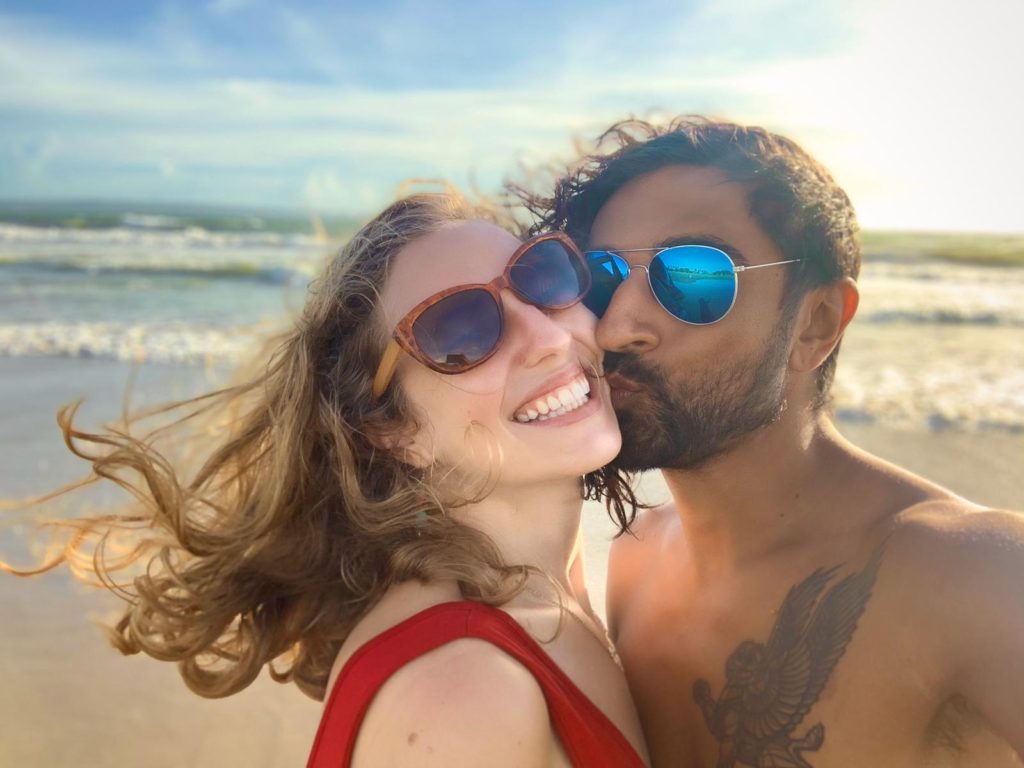
Eri & Jay. (She’s Eri, he’s Jay.)
104. good kids gone wild: horizontal with expat parents (1 of 4)
Hello horizontal lovers. horizontal with lila is Slow Radio. Consensual eavesdropping. Intimacies of all kinds. It’s us lying down right next to each other, wearing robes, sharing secrets, in your ears. Welcome in, and welcome back!
Eri: Then I battled with, Am I a sex addict, and so I went to Christian counseling for a little while during my internship, and that was interesting and, during the same summer where I was receiving Christian counseling for sex addiction, and actually attending Sexaholics Anonymous 12-step program, I met one of my most influential partners who, who was like, “Sunshine, you are not a sex addict. You just enjoy sex! And you just enjoy being with multiple people. And that’s okay. And there’s something called polyamory that you should know about.” And he gave me the book The Ethical Slut. Changed my life. But then I still thought, This isn’t really possible. It’s nice that these authors have found that, but it doesn’t exist in real life in my world. Ended up moving to Seattle shortly thereafter, and very quickly discovering the sex-positive scene, and learning all about polyamory and open relationships […] and entered a really deep meaningful partnership that I would be in for many many years.
Lila: At this point, you think it’s possible.
Eri: Now I’m thinking it’s possible. And not only do I think it’s possible— my partner’s name is Adam, and Adam and I are leaders in the sex-positive community. He co-authored— he was a contributing author to Relationship Agreements— because those were all of our experiences! We spent years trying to understand: How can we take all of our assumptions and expectations that we have, for relationships, and like, wipe ‘em out. And start clean and say— If we could build our own ideal relationship, one that was agile and grew with us and allowed us as individuals to grow, and our relationship to grow, and be treated as separate entities: What would that look like? And, it was through all of our fuckups, all of our going to trainings and all of our experimenting with other partners, that we really developed this. And realized, it doesn’t— you don’t have to have an open relationship to make this work, you can have monogamy too and have very clear expectations, or agreements around like, what you want, instead of having expectations and judgements and instead you can ask for what you want. And you can change it! It’s not like you’re in a legally-binding contract— which a lot of people are often afraid of.
Lila: From all the people that I’ve talked to, the conclusion that I’ve come to is that: polyamorous people— people in other also, other consensually nonmonogamous situations, will make explicit what many monogamous people think are implicit— but then they are misunderstanding each other. And then it feels like betrayal, because they never made these things explicit.
Eri: Riight, and, I remember having this moment where— Adam and I had done so much work together, I mean years of work together and, and we were super proactive in having therapists and having coaches and really being like, constantly learning together. And, we’d had a therapist, probably for four years, and she knew us so intimately, and one of the last times we saw her, I remember her saying, “Wait a minute. You both use the word support, all the time. How you support one another and he supports you and you support him and blablabla.” She’s like, “I don’t think I ever paused to ask you, ‘Adam, what does support mean to you?’”
Lila: Oooo, yeah.
Eri: “Eri, what does support mean to you?” And all of a sudden, it was like somebody had, like, blown our minds, because we had thought we were saying the same thing, and like, really giving each other what they wanted, for years, and it turns out that Adam was completely supporting me in all the ways he thought— that I, said I was supporting him. And vice versa.
Lila: What ways? How was it different?
***
Jaymin: So if your child is acting out, you shouldn’t discipline them, you should find out why they’re calling for attention that they’re not getting, and maybe we should actually, spend time with our kids. Maybe we should, you know, engage them and love them, and let them feel significant and let them feel that they belong and give them some agency. And by doing that, they won’t make these calls for attention, which means that we won’t need to discipline. And discipline is like the hallmark of parenting from the last generation. […] Positive discipline is really about shifting from that. So now if I’m in a place where we have guests over and I’m making dinner, and the kids are going beserkos, and like yelling, and want my attention, instead of being like, “Hey, can you keep it down?” or worse, “Will you shut up?” or anything like that, I’ll get down to their eye level and say, “Hey. Do you need a hug right now?” And then I’ll just love them; I’ll just take two minutes and I’ll tell my guests to wait. I’ll turn down the heat on the stovetop— I’ll just got down to their level and be like, “Hey, what do you need? You want a hug? Can I hold you?” And I’ll lift them up and I’ll cook again, while holding them, and I’ll listen to what they have to say, and my guests will just wait for a moment, ‘cause adults can wait! And then once they feel full, they’ll go run off for the next hour and not bother me, right, and then I can engage in adult conversation again— so it’s really about balancing those things, so positive discipline is all around, you know, like, not needing to use, like, discipline in terms of negative reinforcements, but also giving children the feeling of significance and belonging, giving them agency. Instead of telling them “don’t” do something, which a) doesn’t make sense to a child— is telling them what they can do. So if you tell someone “Don’t climb,” they have to imagine themselves climbing, and then imagine themselves not—
Lila: With an “x” across it!
Jaymin: — not doing that! Which can be a million things! So instead, you use “You can” statements: You can put your feet on the ground. So they can see, in their mind, what it means to put their feet on the ground, realize their feet are on a couch, or whatever they’re climbing, and they can do the thing. […] That’s a way to not always be telling them “no” or “don’t do this” or “don’t do that.” I heard somewhere like, before a child is, like, five, they hear “no” like a thousand times. […]
Lila: That’s so much rejection before the age of 5, right. No, can’t, stop, don’t. You’re not allowed.
Hello horizontal lovers.
horizontal with lila is Slow Radio. Consensual eavesdropping. Intimacies of all kinds. It’s us lying down right next to each other, wearing robes, sharing secrets, in your ears.
Welcome in, and welcome back! It’s been a few months since my last episode — This winter, I got mired in a boggy swamp of depression, stared at the ceiling for a while, binge-watched a lot of dystopian TV, and then journeyed to Bali, Indonesia, to get my juju back.

Cleansing at the Very Sacred Waterfall. February 2020
It’s back!
And… I suppose I live in Bali (for) now!
I’ve missed you. I’ve missed this.
It’s a whole new world out there. And yet. I am more than ever convinced that we need to make private conversations public. I am more than ever convinced that interdependence is the word of the century. I am more than ever convinced that intimacy is the way.
Connection is my wheelhouse. And so, I renew my vows: to dispel shame, combat loneliness, and alchemize human connection.
Most of us are treading water. We might be back with families we haven’t lived with since we were 17, or spending 24/7 with children we’ve never cared for full full-time, or quarantined with our romantic partner, absent any of our usual letting-off-steam rituals, like work or the gym or matcha with friends or anything literally anything besides constant togetherness.
Humans probably haven’t related this month since agriculture was invented. But probably not even then. They had different tasks on the farm then. Homo sapiens probably haven’t related this much since cave-dwelling times. But perhaps not even then. Somebody had to hunt or forage. Somebody left the dwelling-place for hours at a time.
Compressed in our domiciles by the undeniable force and magnitude of this virus, we might very well be relating more, as a species, than at any time in human history. And if we are quarantining alone, we might be lonelier than ever before in our lives.
Much of our relating has become virtual. We have less kinesthetic & energetic cues, as a large part of our intimacy is mediating by electronic boxes.
We need stronger communication skills than ever before. We need a bigger toolbox. At last, I have something to offer the world that the world at large might finally recognize it needs.
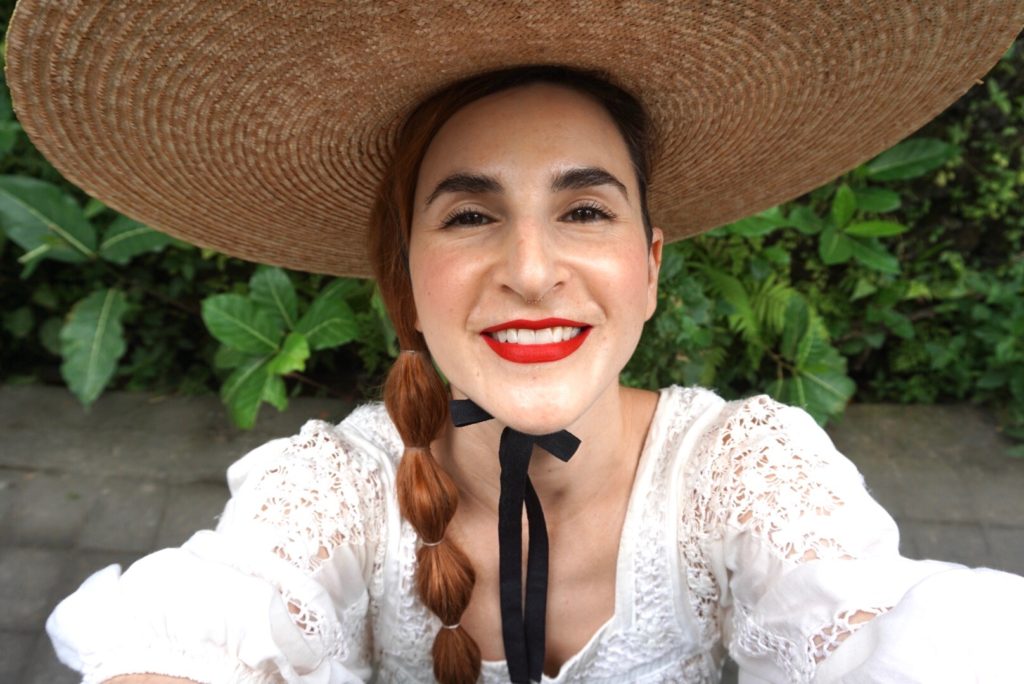
Photos of me in enormous hats with tropical backdrops! I kid, I kid. For real: Connection skills. [Ubud, Bali, Indonesia. February 2020]
During Seasons 1 and 2, I got horizontal with one guest at a time.
In Season 3, I’ve had mostly threesomes: myself plus two guests who are in some kind of relationship with one another. Typically, each recording is between two and three hours long, and divided into two parts — the part ones are available in all the podcast places for all the podcast people, and the part twos are available exclusively for my patrons.
This conversation was recorded over the course of five-ish hours. I’ll divide this conversation into four parts: the first two, episodes 104 & 105, will be available in all the podcast places, and the last two: episodes 106 & 107, will be exclusive to patrons of the horizontal arts.
This is my livelihood for the foreseeable future, so, to all of my current and future patrons:
Thank you for my subsistence,
and thank you for making the world a more intimate place.

This is Jaymin.
In this and the following three episodes, I lie down with Eri Kardos and Jaymin Patel: world travelers, long-time digital nomads, co-parents of two young children, and American expats in Bali.
Friends of Mirelle, my housemate and guest of episode 1. feed your delight, Eri & Jay offered me one of their guest rooms in Ubud. I stayed in their home my first two weeks in Bali. Jaymin told me that in their years of travel, they’d been hosted by legions of people. So they were paying it forward. It was a soft place to land. I’m grateful for the lily pad.
Eri is a Relationship Coach (for busy professionals in both traditional and alternative relationships). She is a Public Speaker, and the author of the book Relationship Agreements: A Simple and Effective Guide for Strengthening Communication, Reducing Conflict, and Increasing Intimacy to Design Your Ideal Relationship.
Her new program, Beyond Mom-Mode, intends to nourish the nurturer.

This is Eri.
Jaymin is a serial entrepreneur, serial author, Public Speaker, and creator of The Integrated Father. His new venture endeavors to guide men as they design a version of fatherhood that nourishes them, their relationships, their kids, their work, and their creativity.
Many of the parenting skills that Eri & Jay mention in our conversation are not just parenting skills, but parenting-ourselves skills. Human-ing skills. Relating skills.
In this, part one of our conversation, we told our comic-book-style origin stories.
Jaymin’s story (let’s call it “The Young Prince,” or, “Jaymin & the Quest for Authenticity”) involves a strict Indian family, sisters and aunties aplenty, bi-cultural identity, being a model Hindu and a very very very good boy, doing right by his parents, musical theatre, people-pleaser recovery, embracing his weird, Adlerian psych, and positive discipline.
Eri’s story (let’s call it “Ode to a Puerto Rican massage,” or, “Sunshine Likes Sex”) involves Polish Roman Catholic & Swedish Lutheran parents, 3 siblings, constant uprootings, dance, 5 or 6 baptisms, a vacation bible school, being a very very very good girl, backpacking across the world, youth hostel life, sex addiction worries, Christian counseling, one excellent Sugar Daddy, Seattle, sex-positivity, her longtime open relating partner Adam, and creating agile relationship agreements.
Come lie down with us in Ubud, Bali, Indonesia.
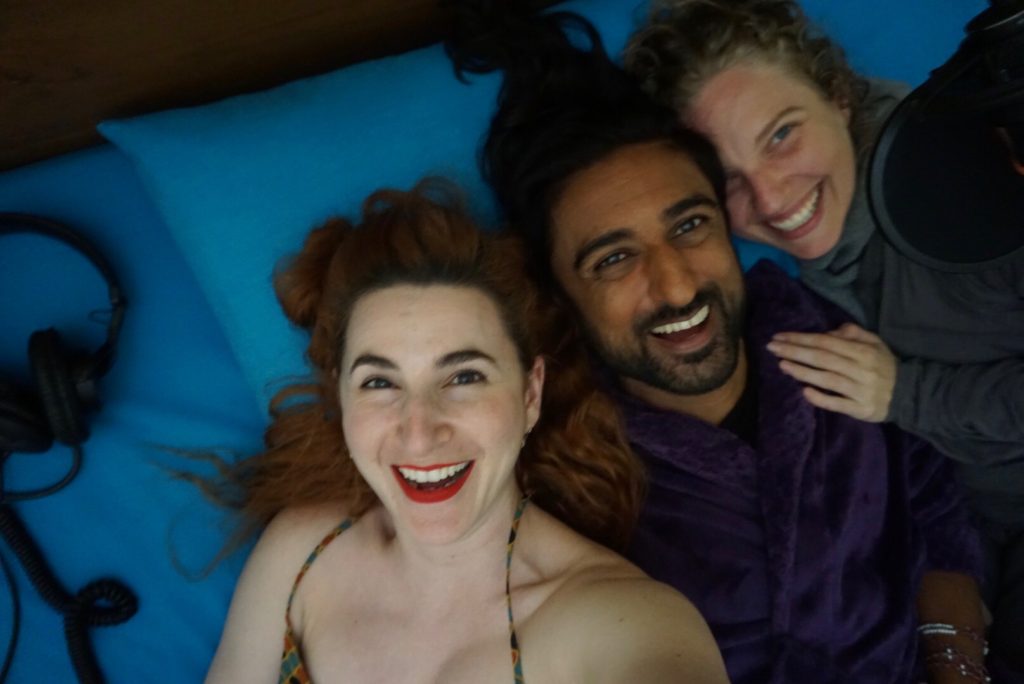
horizontal with Eri & Jay. Ubud, Bali, Indonesia. February 2020
104. good kids gone wild: horizontal with expat parents (1 of 4)
Hello horizontal lovers. horizontal with lila is Slow Radio. Consensual eavesdropping. Intimacies of all kinds. It’s us lying down right next to each other, wearing robes, sharing secrets, in your ears. Welcome in, and welcome back!
Links to Things:
Eri’s website, EriKardos.com
Jaymin’s website, TheIntegratedFather.com
Jaymin’s TEDxUHasselt Talk about being weird, The Surprising Truth About Inspiring Others
The Integrated Father, Jaymin’s newest venture
The Ethical Slut, the seminal sex-positive book that changed Eri’s life
Beyond Mom-Mode, Eri’s most recent venture, designed to nourish the nurturer
Show Notes:
(if you share excerpts, please link to this page or the horizontal Patreon!)
[8:52] Lila’s quickie origin story, including a psychologist and a social worker, a miracle baby, a surrogate cat sibling, colon cancer, divorce, arts high school, a sexual debut, sex party massage, sex-positivity, and how she came to be poly and kink-adjacent.
[15:41] Jaymin’s origin story, aka “The Young Prince,” involving Indian parents from Uganda & Tanzania, an arranged marriage, a long legacy of world-traveling entrepreneurs, the creation of Masaka, Uganda, Hotel / Motel / Patel, his boy-freedoms and sister-aunties.
[20:05] Only Indian cinema, Indian music, until Jaymin was 10. He witnessed the Indians in the US hunker down on their culture, while the Indians in India progressed at a more natural rate of modernization / Westernism.
[21:44] Jaymin on his Indian-American cultural identity.
Jaymin: Every Indian that you might meet who’s of, my generation, grew up very much in this like, Am I American? Am I Indian? Like, it’s hard to be both; it’s hard to assimilate. So it was even tougher for my sisters, and by the time— you know like I actually had like sleeppovers, when I was in high school, which was a big deal. Like, You’re gonna go over to some American family house and sleep there? Like, whoa, you know? And we didn’t like, go out every weekend— we also had a family business; we’d always stay home, so my— yeah my upbringing was very like— I don’t wanna say c— it was more like, contained. You know, it was like very contained.
Lila: Insular.
Jaymin: Insular, family-oriented, but the family business was always an excuse to hang out. You know, my friends would go out, I’d be like, “Mom and Dad, can I go out this weekend?” They’re like, “Didn’t you go out last weekend?” (Lila laughs) “Why don’t you stay at home with us and just be with the family,” which meant watching Indian media from satellite and helping with the business as needed.
Lila: So you felt very much a part of the tribe.
Jaymin: Uh, yeah, not like I really, necessarily wanted to but like, you know, we didn’t have freedom to rebel.
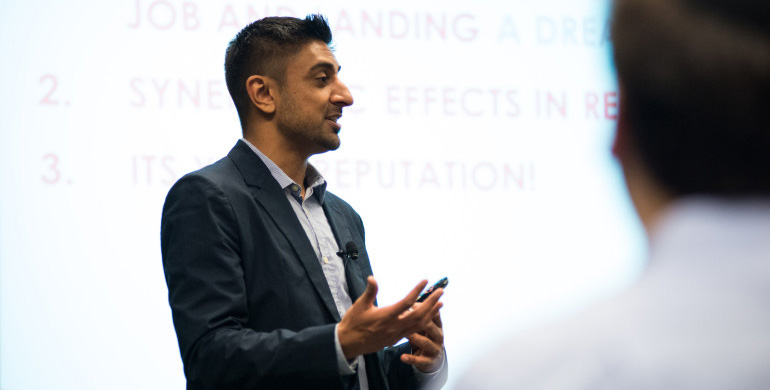
Clean-cut Jaymin doing a good job at stuff. Like making presentations.
[23:00] Jaymin the model child & model Hindu, put on a pedestal. Family members named children after him.
[24:22] Jaymin’s sense of filial obligation.
Jaymin: Really my belief for a long time was that I was the projection of my parents on this planet, and my role in my life was to, like, do good by them. You know, and to fulfill their dreams of— that they had for me, and to be a model child, and to get them, you know like, validation that, they were doing a good job raising me. Because in Indian culture, like, whatever a child does, it’s an immediate reflection on the parent. And so, societally, there’s a lot of pressure, also — and this is common across like all Indian families, for the majority. Some of them kinda were like “Fuck this,” and, you know, went their own way with it, but, you know, all my cousins, we all had this growing up.
[25:11] Jaymin’s parents and their expectations for him.
[26:28] The throughline of Jaymin’s origin story. Alternate title: “Jaymin & the Quest for Authenticity”
[26:44] The validation-seeking behavior of a (recovering) people-pleaser.
[27:04] Jaymin’s TEDxUHasselt Talk about being weird, The Surprising Truth About Inspiring Others
The Surprising Truth About Inspiring Others | Jaymin Patel | TEDxUHasselt
After a ‘defining moment’ in the 3rd grade due to his skin color, Jaymin Patel has ever since been driven to be different. Discover with him the surprising truth about inspiring others. * Jaymin Patel has traveled around the globe, held a variety of job positions-from waiter to forklift driver to model to actor to C-suite adviser for large corporations.
[27:09] Jaymin on authenticity & parenting shame.
Jaymin: Go out there and be weird! Like: Be authentic. Be who you are, you know? And that is, kind of the most meaningful thing for me, is, allowing that authenticity. Which is why I’m so in love with Eri, ‘cause she can hold my pure authenticity in a way that, is just, the most unconditional love I’ve ever felt in my life. And, it’s led me to what I’m doing now, because what I realized is that I, care about how children experience their childhood, and to what extent they can be in touch with their emotions, feel secure in themselves, and, and truly be happy. And the way that society is set up right now, the tools that parents have, like, there aren’t really many that, that like, if if parents go to seek help, like, m— the truth is most parents — or most people — their parents or caregivers didn’t model the best examples of being in a relationship for them, or parenting for them. And now, we live in a world where we have research and Google and, you know, like, books, and all this stuff, but there’s also this level of shame because people say, “Parenting should be intuitive.” And I don’t believe that, I think—
Lila: People say that about sex, too!
Jaymin: So you can take care of a young human, and feed them, and bathe them, and make sure they’re healthy, like, that’s intuitive, how to take care, but how to create secure attachment, how to create like, self-confidence, like, how to be emotionally strong and aware, those things actually are tools that exist that parents don’t have. So everything that I’m doing with The Integrated Father, is combining my years of men’s work — which has helped me be more authentic — and I’m combining that with everything I’ve learned about relationships from Eri, and combining it with all the conscious parenting tools that we use, just so men can actually be more authentic, and, heal through the stuff they they’re carrying from their childhood, and that whole generation, of how masculinity was treated, and then also be in a place where the relationships can have different meaning than what we see on TV, ‘cause it doesn’t work that way all the time. And then have the tools to create a different experience with their children.
[29:20] Lila on Parent Tests.
Lila: I have an unpopular, kind of authoritarian opinion about parenting, which is that, I wish everybody had to pass a test. In order to become a parent you would have to prove, that you had emotional intelligence, that you could resolve conflict.
[29:37] Parenting tools.
Jaymin: When I started learning about some of these tools, especially ones that Eri introduced me to — like, I learned about Adlerian psychology and positive discipline, I was just like, How can anyone be a parent without knowing this? How was I allowed to become a parent without knowing this? Thank God I know it now!
[30:08] Jaymin’s take on Adlerian psychology, in which all actions taken by children are understood as bids for significance and belonging.
Jaymin: So if your child is acting out, you shouldn’t discipline them, you should find out why they’re calling for attention that they’re not getting, and maybe we should actually, spend time with our kids. Maybe we should, you know, engage them and love them, and let them feel significant and let them feel that they belong and give them some agency. And by doing that, they won’t make these calls for attention, which means that we won’t need to discipline. And discipline is like the hallmark of parenting from the last generation. […] Positive discipline is really about shifting from that. So now if I’m in a place where we have guests over and I’m making dinner, and the kids are going beserkos, and like yelling, and want my attention, instead of being like, “Hey, can you keep it down?” or worse, “Will you shut up?” or anything like that, I’ll get down to their eye level and say, “Hey. Do you need a hug right now?” And then I’ll just love them; I’ll just take two minutes and I’ll tell my guests to wait. I’ll turn down the heat on the stovetop— I’ll just got down to their level and be like, “Hey, what do you need? You want a hug? Can I hold you?” And I’ll lift them up and I’ll cook again, while holding them, and I’ll listen to what they have to say, and my guests will just wait for a moment, ‘cause adults can wait! And then once they feel full, they’ll go run off for the next hour and not bother me, right, and then I can engage in adult conversation again— so it’s really about balancing those things, so positive discipline is all around, you know, like, not needing to use, like, discipline in terms of negative reinforcements, but also giving children the feeling of significance and belonging, giving them agency. Instead of telling them “don’t” do something, which a) doesn’t make sense to a child— is telling them what they can do. So if you tell someone “Don’t climb,” they have to imagine themselves climbing, and then imagine themselves not—
Lila: With an “x” across it!
Jaymin: — not doing that! Which can be a million things! So instead, you use “You can” statements: You can put your feet on the ground. So they can see, in their mind, what it means to put their feet on the ground, realize their feet are on a couch, or whatever they’re climbing, and they can do the thing. […] That’s a way to not always be telling them “no” or “don’t do this” or “don’t do that.” I heard somewhere like, before a child is, like, five, they hear “no” like a thousand times. […]
Lila: That’s so much rejection before the age of 5, right. No, can’t, stop, don’t. You’re not allowed.
[33:42] Lila’s yoga teaching concept — a shift from “my bad side” to “the side that needs more love.”
[34:59] Jaymin’s “weird.”
[35:43] A band announcer / musical theatre interlude. Jay’s mom would say, “Stop all this naatak.”
[40:55] In which we sing a snippet or two of Guys & Dolls.
[41:47] Singing to kids. #parentingtip
Eri: You want your kids to listen to you, try singing what you want them to hear. (sings) Take your dishes to the sink, take your dishes to the sink, you can take your dishes to the sink!
[42:26] Jaymin on compliments and truly being seen.
[44:14] Lila on her most impactful compliments (there’s insecurity involved).
[45:17] Eri on Jaymin’s taste for aesthetics, and her experience with the Fashion Shaman, or the Fa’Shaman (Jennifer of Wildflower Designs). Style Forecast Cards & Fashion Archetype cards and self-expression.
[50:32] Eri the eldest of 4; Jay the youngest of 3 (pampered by sisters, mom, and grandmas). How this plays out in Eri’s love of REI.
[51:03] On the masculine / feminine polarity in their relationship.
Jaymin: So she’s had much more of this masculine style, or approach to style and function, so when we got together and through parenting, it actually became this beautiful invitation for me to step more into my masculine, like finally caretaking somebody else instead of always being caretaken of, with two sisters and two grandmas and a mom, always doing everything for me. And then for her, to really relax into her feminine. You know?
Eri: Which was so hard.
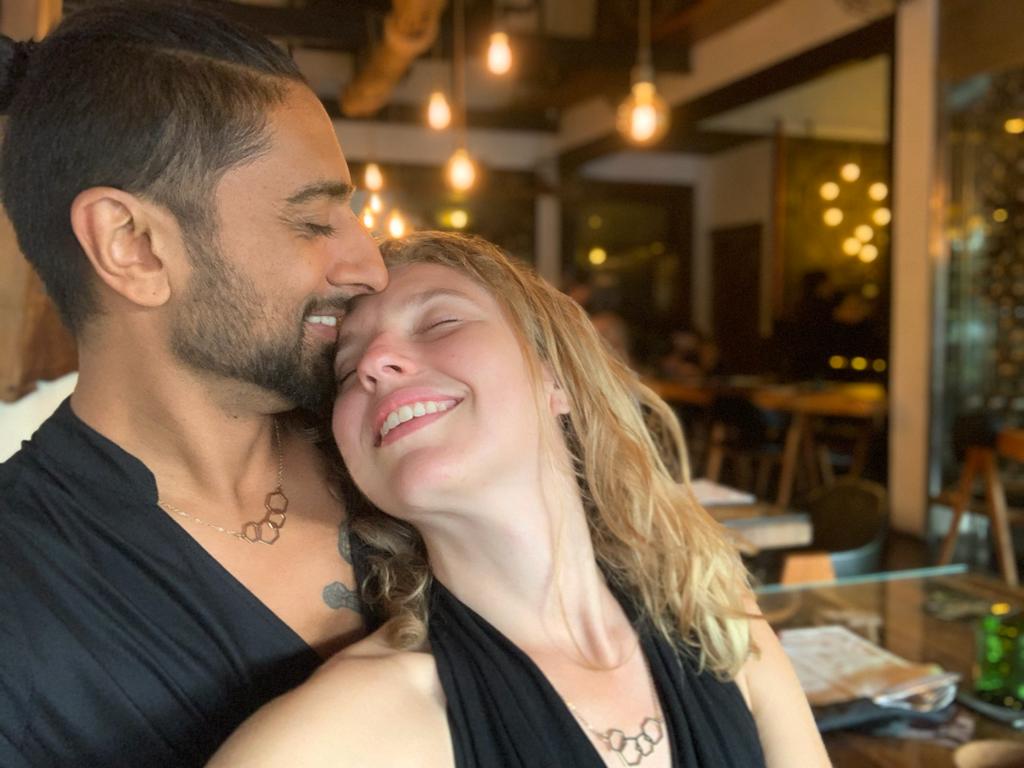
Jaymin: […] It’s cool ‘cause we both have masculine and feminine aspects— and we can play with them a lot.
Lila: That is what I would hope for it to be, right, a dance! With invitation and play and …
Jaymin: Flow.
[52:19] Eri’s origin story, aka, “Ode to a Puerto Rican Massage,” beginning with Michigan roots, Polish Roman Catholic & Swedish Lutheran parents, a renegade wedding, and Midwestern nomadism.
[54:40] How junior high school Eri put her foot down on moving again, and her family finally stayed put.
[56:19] The story of the snowstorm, the school bus, the shovel, and the church that made Eri feel at home.
[57:42] Eri’s mime gig / vacation bible school show at the evangelical Presbytarian Community Church lead to putting her foot down again— this time on choosing her own church.
[58:54]
Eri: I was baptised in my life like five times now? Five or six times?
Lila: Wow!
Eri: Yeah. Yeah. You can never been clean enough.
Lila: (giggling) Does that mean you’re a dirty girl?
Eri: I probably need another baptism soon!
[59:34] How Eri was a very very very good girl.
Jaymin: We’re the same person in different people’s bodies. […]
Lila: Does it really feel that way?
Jaymin: (overlapping Eri) When we met…
Eri: (overlapping Jaymin) When we first met— we were like, Oh my God you are exactly the same person as me. This is so weird.
Jaymin: Like, let’s go give life together, ‘cause we want to live it in the same way. When we met, she was the only person I’ve met — woman I’ve met — that had been to more countries than I had been to. I had been to 47; she’d been to 48.
Eri: We both grew up in the Midwest, in conservative religious families. We both were the high achievers, we graduated with all the accolades, we finished school early. We went to business school and we were some of the youngest—
Jay: We went the same year—
Eri: We went to the same year for business school.
Jay: And she was younger than me, by six months, so we were the youngest in our entire class.
Eri: Mmmhmm.
Jay: We went to the same conferences, and didn’t know that, each other was there.
Eri: Same festivals.
Jay: Same festivals that we went to, like Burning Man. And then we even got corporate jobs, the same year we graduated, we got corporate jobs. And then we left those corporate jobs, to help people through our coaching and speaking and books. And we’ve traveled the world. I mean, everything about our lives is extremely parallel.
Lila: At some point, there’s, there’s a disillusionment or there’s a reckoning, or something, right? At some point of the like, the perfect Good Girl Good Boy… y’know…
Eri: Oh yah.
Jay: Well now, now it’s just like, we’re perfect mirrors for each other, which is really what I believe relationships are is that, your partner can show you a mirror to the parts of yourself that, need healing when they’re ready, and together, with the relationship tools that Eri’s taught me, we’re able to navigate those pieces and let go of that, you know, Good Boy / Good Girl validation-seeking behavior, and to w— do all the work on like, true love and unconditional love and loving unconditionally. I mean, there’s just so many layers that, I, I personally have to undo around how I was raised.
[1:01:56] Eri’s mom taught Sex Ed class at her Catholic school / the spit in a cup simile .
[1:03:26]
Eri: We had some beautiful conversations about how our bodies work and how God designs us like a puzzle piece, and there’s like, one piece that will fit so perfectly with our bodies. And later on, I remember reflecting on this after I’d had multiple partners, and thinking, Wow, I’m like, the universal puzzle piece. I fit with everybody!
[1:03:51] Eri’s sexual awakening around 10 years old, and her sexual Erotic Blueprint. A very sexual, very religious girl, secretly dating the bad boys.
[1:04:25]
Eri: So imagine I’m like, a young teenager, very sexually-driven— and also very religious. At this point, like, now I move into my high school years, and I’m helping run, the worship band at our church, and I’m a leader in our youth group, and, like all the model stuff, that you’re supposed to be doing— but I’m secretly having all these crazy desires to, like, know what it’s like to have a guy’s tongue down my throat, or to have— or to like, see what a penis would look like! And this wasn’t okay, so I had my own outlet, where I’d always date the bad boy. And it would kind of be like, on the downlow.
Lila: How did you reconcile it, internally?
Eri: It just, like— no one ever really gave me a lot of crap about it, it was just sort of like, “Oh are you sure you don’t want to be dating a good Christian man?” And there was still lots of, “I’m gonna save him. So I think that’s how I reconciled it. I was somehow going to save him for Jesus. So that was really— ahhhhhh. And I didn’t— you know it took me til I was maybe 18, maybe even 19, before I chose to have my sexual debut f— in the bigger realm, but until then, there’s a lotta loopholes in Christianity that aren’t specifically addressed in the Bible, like anal, or like, receiving oral, and the way that I interpreted the Bible, and my youth group’s message to me was, number one: My youth group leader would not talk to me about sex, because he was a man, and all the women would only talk about becoming good wives, and about intimacy and cuddling and things like that, and they didn’t wanna talk about sex. So I felt very alone. I felt like, a lot of masculine drive, but there was no outlet for me as a woman in the church, who felt sexual. (overlapping) There was no space for that.
Lila: Did you talk to any peers?
Eri: Oh, I talked to a woman’s youth group about it, but every— no one could understand or relate, everyone was like, I just wanna cuddle with him; Wouldn’t it be great if I was his girlfriend? And I’m like, Wouldn’t it be great if I could stick his cock in my mouth!
[1:06:43] Eri’s first relationship of consequence.
Eri: And I find this amazing outlet through my partner— my first like, real partner, who I connected with sexually, and, he was just so sweet; I think we dated for a year, and he would go down on me regularly, and I would have these amazing orgasms, and I felt like somehow, not sinful— it felt like okay to receive ‘cause I wasn’t doing anything. (giggle) I just had to lay there and receive! (Lila giggles) But I never saw his penis. I never touched it. Like, he stayed with his clothes on. For the full year! And I think it was like—
Lila: He’s fully-clothed, going down on you?
Eri: Sometimes, he’d get down to like, his pants. Like, that’s as far as I would let him go. And finally, one day, he’s like, “Will you at least like — you don’t have to look at it — will you just touch it?!” And I’m like, “Nooo!”
Lila: I love this double standard going the other way!
Eri: It was fantastic, and I love oral to this day. Eventually, we got to the point where we had intercourse, and had lots of exploration, and it was wonderful, and it was like, a beautiful, beautiful connection. And through him I learned a lot about saying no. Like I would just go to his house to relax and do nothing. Whereas the rest of my life was, constantly pleasing people, constantly saying yes, getting migraines all the time and not knowing why I was getting them. And just being overwhelmed and stressed and there I could relax, and say no to all the things I didn’t wanna do, and say yes to just receiving pleasure.
[1:08:11] European backpacking years, undergrad Sexual Psychology major, manager at a youth hostel in Boston.
Eri: Youth hostels are like all-you-can-eat buffets for sexuality. So I got to try everything I was hungry for.
Lila: What did you try?
Eri: Uh, everything.

[1:08:45] Eri’s very happy birthday Puerto Rican massage
[1:09:17] The Youth Hostel era and the former NKOTB tour manager who was papa to the youth hostel workers. House rules: Stock a full supply of condoms. Don’t get involved with anybody who stays for more than two nights.
[1:10:21] Business school
[1:10:48] The Sugar Daddy who paid for her to study with / shadow pro dommes, and How kink turned out to be “not as fucked up as she thought.”
[1:12:42]
Eri: Then I battled with, Am I a sex addict, and so I went to Christian counseling for a little while during my internship, and that was interesting and, during the same summer where I was receiving Christian counseling for sex addiction, and actually attending Sexaholics Anonymous 12-step program, I met one of my most influential partners who, who was like, “Sunshine, you are not a sex addict. You just enjoy sex! And you just enjoy being with multiple people. And that’s okay. And there’s something called polyamory that you should know about.” And he gave me the book The Ethical Slut. Changed my life. But then I still thought, This isn’t really possible. It’s nice that these authors have found that, but it doesn’t exist in real life in my world. Ended up moving to Seattle shortly thereafter, and very quickly discovering the sex-positive scene, and learning all about polyamory and open relationships. […] So now we’re in Seattle. I have already discovered polyamory and open relating and, just been blown away by this, and entered a really deep meaningful partnership that I would be in for many many years.
Lila: At this point, you think it’s possible.
Eri: Now I’m thinking it’s possible. And not only do I think it’s possible— my partner’s name is Adam, and Adam and I are leaders in the sex-positive community. He co-authored— he was a contributing author to Relationship Agreements— because those were all of our experiences! We spent years trying to understand: How can we take all of our assumptions and expectations that we have, for relationships, and like, wipe ‘em out. And start clean and say— If we could build our own ideal relationship, one that was agile and grew with us and allowed us as individuals to grow, and our relationship to grow, and be treated as separate entities: What would that look like? And, it was through all of our fuckups, all of our going to trainings and all of our experimenting with other partners, that we really developed this. And realized, it doesn’t— you don’t have to have an open relationship to make this work, you can have monogamy too and have very clear expectations, or agreements around like, what you want, instead of having expectations and judgements and instead you can ask for what you want. And you can change it! It’s not like you’re in a legally-binding contract— which a lot of people are often afraid of.
Lila: From all the people that I’ve talked to, the conclusion that I’ve come to is that: polyamorous people, people in other also, other consensually nonmonogamous situations, will make explicit what many monogamous people think are implicit— but then they are misunderstanding each other. And then it feels like betrayal, because they never made these things explicit.
Eri: Riight, and, I remember having this moment where— Adam and I had done so much work together, I mean years of work together and, and we were super proactive in having therapists and having coaches and really being like, constantly learning together. And, we’d had a therapist, probably for four years, and she knew us so intimately, and one of the last times we saw her, I remember her saying, “Wait a minute. You both use the word support, all the time. How you support one another and he supports you and you support him and blablabla.” She’s like, “I don’t think I ever paused to ask you, ‘Adam, what does support mean to you?’”
Lila: Oooo, yeah.
Eri: “Eri, what does support mean to you?” And all of a sudden, it was like somebody had, like, blown our minds, because we had thought we were saying the same thing, and like, really giving each other what they wanted, for years, and it turns out that Adam was completely supporting me in all the ways he thought— that I, said I was supporting him. And vice versa.
Lila: What ways? How was it different?
[1:17:15] What does support mean to you?
Eri: I ask this to everybody I work with now, like, What does support mean to you? Like, how do you receive love? It’s like going back to the love languages. And for him, […] he wanted a lot of emotional support, and he wanted things in ways that didn’t come naturally to me, that I have learned how to, um, use more skillfully, especially with Jaymin.
Lila: You mean, nurturing kind of things?
Eri: Yeah. Yeah, like, for example, if Adam would get sick, I’d get really pissy. ‘Cause, I feel like, for me, and a lot of women I know, if we get sick, then, we become like cats, and we kind of go hole ourselves off for a little bit, wanna be alone and read and take our medicine and do our bubble baths, and then we come back healed! As soon as we’ve taken care of ourselves. And then I feel like, most men that I’ve known, are like my 2 year-olds, and, when they get sick, they just want Mommy! And I’m the closest thing to Mommy, you know, when there’s no one else around. And so, they’re like, Now nurture me and love me and stay home from work and take care of me and make me my favorite soup! And I’m like, What the fuck? Go take care of yourself and leave me alone!
Lila: You’re like, I do not wanna Mommy you.
Eri: I don’t wanna Mommy you at all. That said, I don’t know why I was so harsh, right? And so eventually we got to the point where he even bought a mug that said, “Please be nice to me; I’m sick.” (laughter) […] Yeah, and then, for me, support meant financial, and showing up in this way where he was going to be financially showing up at least 50% in our relationship, and that— and even though we’d had this discussion, and we were saying the same word, we had very different meanings. So, now when I talk with couples, I’m like, “What does marriage mean to you?”
104. good kids gone wild: horizontal with expat parents (1 of 4)
Hello horizontal lovers. horizontal with lila is Slow Radio. Consensual eavesdropping. Intimacies of all kinds. It’s us lying down right next to each other, wearing robes, sharing secrets, in your ears. Welcome in, and welcome back!
